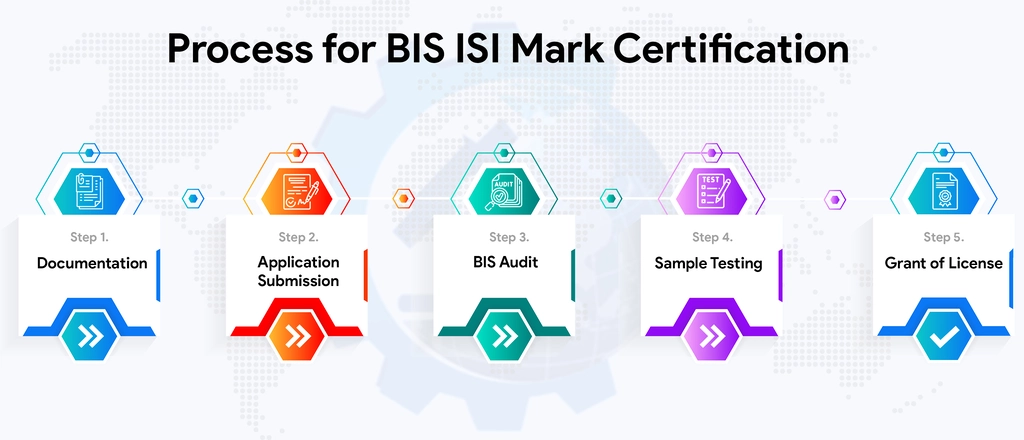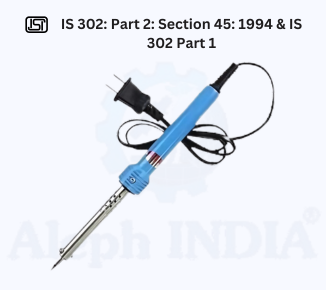BIS CERTIFICATION FOR Safety of household and similar electrical appliances: Part 2 Particular requirements, Sec 45 Electric heating tools IS 302: Part 2: Section 45: 1994 & IS 302 Part 1
Published Date: October 04, 2024
Introduction
IS 302 Part 2: Section 45: 1994 & IS 302 Part 1 are the Insian standard by BIS Certification for safety requirements of all electrical appliances, especially in the lighting industry. These products are used in almost all homes and businesses. Therefore, they have great importance in the booming market of India. Some of the main end-use areas consist of lighting solutions, both for residential, commercial, and industrial sectors. The market strength is very strong as demand increases with urbanization and infrastructure in India. It supports exports and imports.
For the sale in India, they require BIS certification with an ISI mark. Custom clearance is important as they satisfied the QCO order. The cost of BIS certification may vary, but a BIS certificate augments the level of customer confidence based on quality and safety.
Overview of IS 302
IS 302: Part 2: Section 45, 1994 standard for safety requirements fo electric heating appliances of domestic and similar use. It pertains to protection against electric shock, mechanical risks, and thermal hazards. It covers soldering irons and heat guns but not high-frequency heating appliances, welding equipment or appliances used in explosive environments. Appliances intended for use by children or the aged shall have relevant supplementary safety features.
Key highlights
| Product Name | Safety of household and similar electrical appliances: Part 2 Particular requirements, Sec 45 Electric heating tools. |
| Applicable Indian Standard | IS 302: Part 2: Section 45: 1994 & IS 302 Part 1 (for General Requirements) |
| Applicable Certification Scheme | Scheme I |
| Applicable Mark: | BIS ISI Mark |
| Compliance Requirement | Mandatory |
| Quality Control Order | Click here |
| Ministry | Ministry of Commerce and Industry |
| Scope as per Standard | IS 302-1 (1979) applies to portable electric heating tools and similar appliances, with or without motors, rated at 250 V ac single phase or dc. This standard includes tools that can be mounted as fixed tools without alteration, as well as those not meant for normal household use that may pose dangers in public settings, such as shops, light industry, and farms. Examples of covered tools include soldering irons, heat guns, and glue guns. However, the standard does not address specific hazards in environments with young children or vulnerable individuals, where additional requirements may be needed. Exclusions from the standard are tools for high-frequency heating, arc welding and carbon-arc brazing equipment, and those intended for use in explosive atmospheres. Additionally, tools meant for vehicles, ships, or aircraft may require further specifications. |
| Major Country of Import | China, followed by countries in Europe and North America. |
Applicable Tests for IS 302
Mandatory Tests:
- Rating
- Classifications
- Marking
- Protection against access to live parts
- Starting Of Motor-Operated Appliances
- Power Input and Current
Optional Tests:
- Transient over voltages
- Overload protection of transformers and associated circuits
- Endurance
- Abnormal operation
- Stability and Mechanical hazards

Note
For Detailed Information about the Procedure for BIS ISI Certification, Visit :
Timeline for BIS Certification
The approximate timeline to obtain BIS certification Safety of household and similar electrical appliances: Part 2 Particular requirements, Sec 45 Electric heating tools IS 302: Part 2: Section 45: 1994 & IS 302 Part 1 is as follows:
- For Indian Manufacturers (Standard Timeframe – 30 days)
- For Foreign Manufacturers (Standard Timeframe – 180 days)
Benefits of BIS Certification
BIS certification enhances product credibility, boosts consumer trust, expands market access, and provides a competitive edge for manufacturers.
| Benefit | Description |
|---|---|
| Access to the Indian Market | BIS certification is often a prerequisite for selling products in India, facilitating easier entry into a vast and growing market. |
| Compliance with Indian Standards | Ensures that products meet established safety and performance benchmarks, aligning with national regulations and standards. |
| Enhanced Product Credibility | The BIS mark signifies that a product has undergone rigorous testing, enhancing its credibility and reputation in the eyes of consumers and retailers. |
| Increased Customer Trust | Consumers are more likely to choose certified products, knowing they adhere to safety and quality standards, which boosts overall customer satisfaction. |
| Benefits for MSMEs | Small and medium enterprises gain a competitive edge by obtaining BIS certification, as it opens up opportunities for government contracts and partnerships. |
Conclusion
BIS certification is a strategic asset that fosters quality assurance and market growth for businesses in India. ALEPH INDIA assists manufacturers in achieving this crucial verification.
For more updates and detailed procedures, stay connected with Aleph INDIA and ensure your products are always compliant and top-quality.
Frequently Asked Questions
International Audits & Participation
Testimonials
BIS REGISTRATION FOR ELECTRONIC & IT PRODUCT
In the era of globalization, world trade is growing rapidly and henceforth, Manufacturing and Import/Export businesses are also growing drastically...View More
BIS CERTIFICATE FOR FOREIGN MANUFACTURER
The Economy of India-the fastest developing economy on the globe with the capabilities that help it matches up with the biggest international...View More
PRODUCT CERTIFICATION SCHEME (ISI MARK) FOR DOMESTIC MANUFACTURERS
Anything a person buys from food to cars, clothes to electronics, branded to unnamed products there is always a question that wanders in one’s...View More
WIRELESS PLANNING AND COORDINATION (WPC)
WPC: Wireless means communication done from one point to another point without the wires and cables. Electromagnetic waves carry the ...View More
BUREAU OF ENERGY EFFICIENCY (BEE) CERTIFICATE
BEE CERTIFICATE: Energy is the future, and its conservation is the way of the bright future. Everyone claims the environment is important...View More
E-WASTE MANAGEMENT
E-waste is one of the world's fastest-growing trash streams. We currently manufacture almost 50 million tones of it each year...View More
View All Services
Request a call back.
Would you like to speak to one of our Senior Technical advisers over the phone? Just submit your details and we’ll be in touch shortly. You can also email us if you would prefer.






























